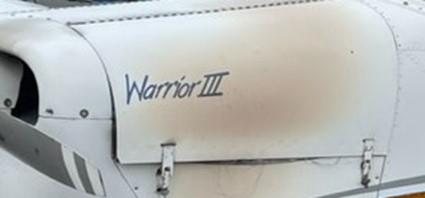| Occurrence Briefs are concise reports that detail the facts surrounding a transport safety occurrence, as received in the initial notification and any follow-up enquiries. They provide an opportunity to share safety messages in the absence of an investigation. |
What happened
On 11 October 2022 at 0950 local time, a student pilot prepared a Piper PA-28-161 for a solo navigation exercise at Moorabbin, Victoria. Prior to the flight, the instructor had inspected the aircraft and signed the maintenance release. The student then conducted their own inspection of the aircraft noting there were no defects, which was consistent with the instructor’s assessment.
The student actioned the pre-start checklist but reported difficulty starting the engine after using the electric prime for approximately 5 seconds on the first attempt, and another 3 seconds on the second attempt. On the third attempt, a loud ‘pop’ was heard from the engine, and the student elected to exit the aircraft and ask for help. At this time, smoke was observed emanating from the engine cowling and, upon opening, a fire was found around the carburettor. A fire extinguisher was obtained and the student returned to the aircraft and extinguished the flames. The aircraft sustained minor damage to the engine and surrounding airframe.
Figure 1: Burnt engine cowling

Source: Operator
Safety action
The operator’s pre-start checklist called for an engine fire brief prior to starting, which requires fuel isolation and continued engine cranking to ingest and extinguish a fire. In this case, the student had not suspected an engine fire until after exiting the aircraft. The operator has raised the matter at a recent safety training day for students.
The operator is also reviewing the aircraft pre-start checklist which will include monitoring of the fuel pressure after application of the fuel pump to determine possible malfunctions of the carburettor.
Safety message
Different start procedures may be required for cold and hot starts, and therefore pilots should have an understanding of what these differences mean in terms of engine management and possible consequences. Checklists are a prompt to ensure the required steps are taken to achieve a desired configuration or process. Aircraft manuals are a valuable source of information when it comes to normal starting procedures, and further guidance may be available through company operating procedures. The Aircraft Owners and Pilots Association (AOPA) publication Aircraft Fires - AOPA discusses multiple aircraft fire types. The section regarding engine fires on start notes it as a very common occurrence, which highlights the importance of remaining vigilant during engine starts.
About this report
Decisions regarding whether to conduct an investigation, and the scope of an investigation, are based on many factors, including the level of safety benefit likely to be obtained from an investigation. For this occurrence, no investigation has been conducted and the ATSB did not verify the accuracy of the information. A brief description has been written using information supplied in the notification and any follow-up information in order to produce a short summary report and allow for greater industry awareness of potential safety issues and possible safety actions.


